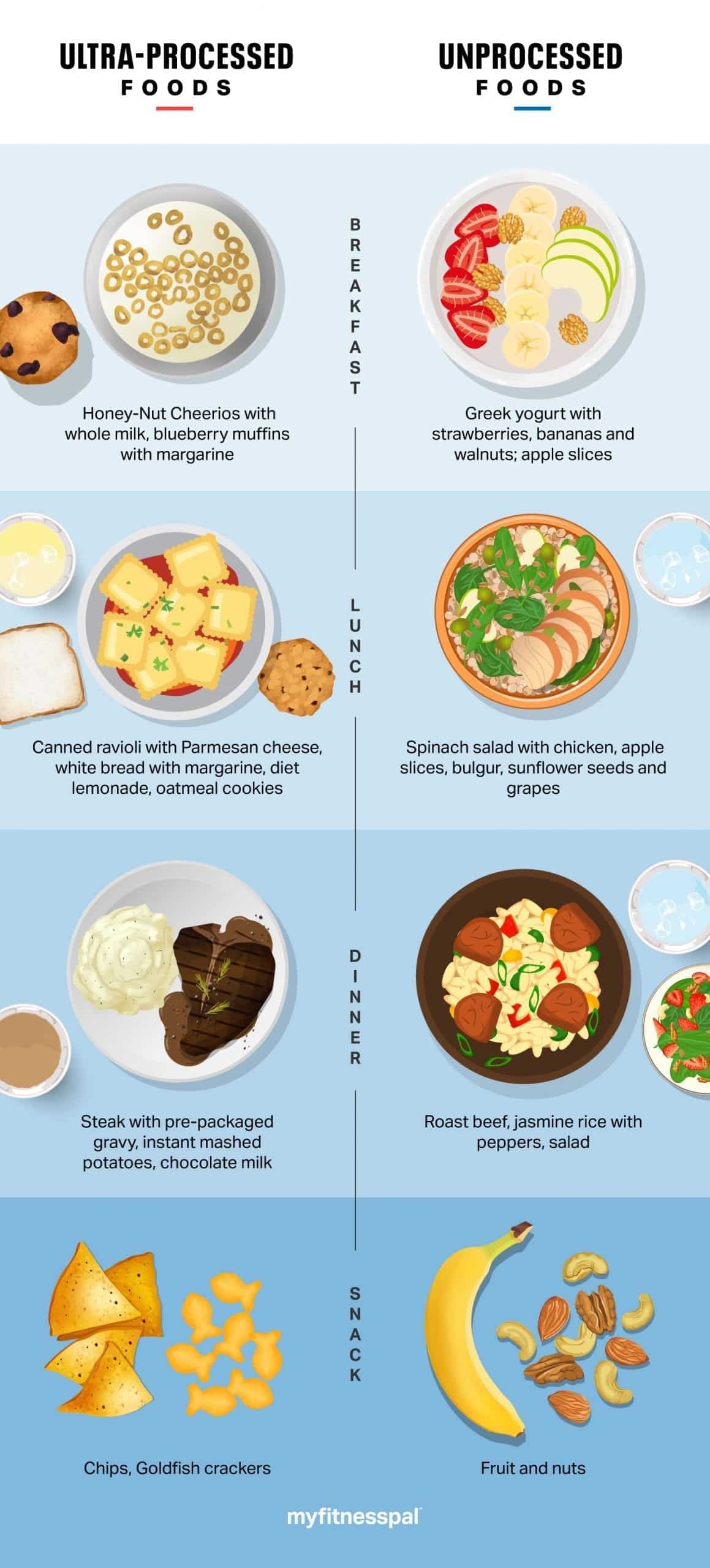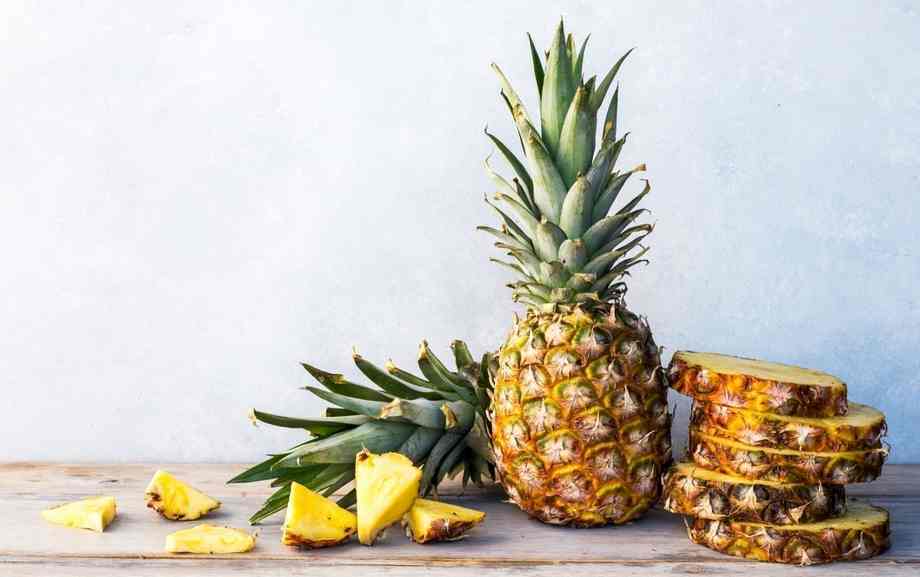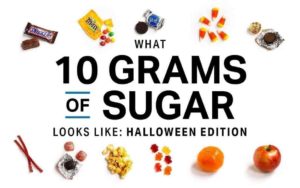On the subject of weight reduction and vitamin, what number of energy you eat and the way a lot you train are two apparent components to look at. However whereas a doughnut and a number of other cups of recent pineapple are roughly 200 energy, not all energy are created equal. There are different necessary components to think about past energy and macros — the place the meals comes from, the way it’s processed and what’s added to it. The Nationwide Institutes of Well being not too long ago printed a brand new examine that explores the subject.
Right here, what it is advisable know in regards to the examine, different analysis on the subject and the way you need to use this data to assist enhance your personal well being and food regimen:
THE LATEST RESEARCH
Researchers developed a meals classification system that separated meals into 4 classes based mostly on the extent to which they have been processed:
- Unprocessed or minimally processed fruits, greens, beans, complete grains, eggs, meats
- Processed culinary elements (i.e., oils, butter, salt)
- Processed meals (i.e., canned meals, bread and cured meat)
- Extremely-processed meals (i.e., candy or savory snacks, ready-to-eat packaged meals, snack bars, poultry and fish nuggets). Extremely-processed meals are designed for mass consumption, hyper-palatability, and excessive profitability by including salt, sugar, oil and/or preservatives to increase shelf life and improve ease of consumption. Then again, unprocessed meals don’t add salt, sugar or fats and solely bear minimal processing to make them fit for human consumption.

The examine individuals spent two weeks consuming as a lot as they wished from an ultra-processed meals food regimen after which one other two weeks consuming an unprocessed food regimen (the place that they had each meal ready for them).
Researchers discovered individuals ate extra of the processed meals, to the tune of roughly 500 energy per day, regardless that the processed and unprocessed meals had the identical quantity of energy, protein, carbohydrates, fats, fiber and sodium. The outcomes present whenever you eat processed meals and watch your portion sizes, you’ll nonetheless really feel much less full and wish to eat greater than should you ate extra filling, unprocessed meals.
UNPROCESSED VERSUS PROCESSED FOODS
Fiber and protein discovered extra generally in unprocessed meals ought to make you are feeling full longer, and sodium in processed meals typically makes you wish to eat extra of that individual meals. Nevertheless, this examine discovered even when these components are matched, the themes ate extra energy on an ultra-processed meals food regimen.
Nonetheless, the examine didn’t discover why individuals ate extra on the ultra-processed meals food regimen. They discovered individuals loved every of the meals equally, so this was not a case of “wholesome meals tastes dangerous so I’m not going to eat it.” Apparently, researchers discovered individuals ate ultra-processed meals sooner (consuming 10 energy extra per minute) in comparison with unprocessed meals.
In addition they discovered that whereas each meals had the identical quantity of fats and carbs, topics consumed extra fats and carbs on the ultra-processed food regimen (most of which occurred at breakfast and lunch), whereas consuming the identical quantity of protein because the unprocessed food regimen.
WHAT ABOUT PREVIOUS RESEARCH?
Earlier analysis reveals ultra-processed meals are usually decrease in protein and fiber, and people vitamins make you are feeling full sooner and for longer. Variations in calorie consumption have been considered because of the lack of protein and fiber within the ultra-processed meals, however this new examine throws a wrench in that speculation since fiber and protein have been the identical, whereas fats and carbs have been larger within the ultra-processed food regimen.
One potential cause could possibly be that on this new examine, the supply of fiber within the ultra-processed food regimen was not from the meals itself. As a substitute, fiber dietary supplements have been added to the drinks as a result of the meals was not wealthy sufficient in fiber to match the unprocessed food regimen. Fiber dietary supplements in drinks don’t affect satiety the way in which fiber in meals does, which can have contributed, at the very least partially, to the overconsumption of energy.
One other piece of the puzzle comes from earlier analysis on the “protein leverage” concept. People unconsciously attempt to eat sufficient protein to maintain their our bodies. In the event that they aren’t getting sufficient protein, they may improve the quantity of energy they eat total in an try and get extra protein. Since much less protein was consumed earlier within the day, individuals could have overeaten later with out realizing it was their physique’s approach of signaling it wanted extra protein.
Extremely-processed meals like food regimen soda are sometimes excessive in synthetic sweeteners, leading to deceptive starvation alerts. The tongue tastes the soda’s sweetness and expects energy, so the physique reacts by releasing enzymes to digest energy. When it doesn’t get them, it makes you hungry, thus you’re extra prone to overeat.
THE BOTTOM LINE
Irrespective of the place you fall along with your consuming methods, this new examine reveals the standard of energy matter, particularly whenever you’re consuming to drop a few pounds. For those who’re attempting to cut back your total meals consumption, you’ll wish to optimize the energy you’re consuming so you are feeling full each day. It’s attainable consuming much less could be simpler should you follow complete, unprocessed meals and eat extra protein earlier within the day. It’ll be simpler to construct and maintain wholesome habits as a result of your starvation will likely be extra glad along with your meals.
It’s additionally necessary to be conscious of the pace at which you eat. This examine illustrates that whenever you eat sooner, you eat extra and it’s simpler to take action when consuming ultra-processed meals. For greatest outcomes, decelerate and luxuriate in your meals with out distractions.
In the end, whereas calorie counting and particular macro breakdowns could be useful in gauging what your physique wants, give attention to consuming complete meals and throw in ultra-processed meals as an exception to your behavior.
Citations:
Poti, J.M., Mendez, M.A., Ng, S.W., and Popkin, B.M. (2015). Is the diploma of meals processing and comfort linked with the dietary high quality of meals bought by US households? Am J Clin Nutr 101, 1251-1262
Poti, J.M., Braga, B., and Qin, B. (2017). Extremely-processed Meals Consumption and Weight problems: What Actually Issues for Well being-Processing or Nutrient Content material? Present weight problems studies 6, 420-431.
Martinez Steele, E., Raubenheimer, D., Simpson, S.J., Baraldi, L.G., and Monteiro, C.A. (2018). Extremely-processed meals, protein leverage and vitality consumption within the USA. Public Well being Nutr 21, 114-124.
On the subject of weight reduction and vitamin, what number of energy you eat and the way a lot you train are two apparent components to look at. However whereas a doughnut and a number of other cups of recent pineapple are roughly 200 energy, not all energy are created equal. There are different necessary components to think about past energy and macros — the place the meals comes from, the way it’s processed and what’s added to it. The Nationwide Institutes of Well being not too long ago printed a brand new examine that explores the subject.
Right here, what it is advisable know in regards to the examine, different analysis on the subject and the way you need to use this data to assist enhance your personal well being and food regimen:
THE LATEST RESEARCH
Researchers developed a meals classification system that separated meals into 4 classes based mostly on the extent to which they have been processed:
- Unprocessed or minimally processed fruits, greens, beans, complete grains, eggs, meats
- Processed culinary elements (i.e., oils, butter, salt)
- Processed meals (i.e., canned meals, bread and cured meat)
- Extremely-processed meals (i.e., candy or savory snacks, ready-to-eat packaged meals, snack bars, poultry and fish nuggets). Extremely-processed meals are designed for mass consumption, hyper-palatability, and excessive profitability by including salt, sugar, oil and/or preservatives to increase shelf life and improve ease of consumption. Then again, unprocessed meals don’t add salt, sugar or fats and solely bear minimal processing to make them fit for human consumption.

The examine individuals spent two weeks consuming as a lot as they wished from an ultra-processed meals food regimen after which one other two weeks consuming an unprocessed food regimen (the place that they had each meal ready for them).
Researchers discovered individuals ate extra of the processed meals, to the tune of roughly 500 energy per day, regardless that the processed and unprocessed meals had the identical quantity of energy, protein, carbohydrates, fats, fiber and sodium. The outcomes present whenever you eat processed meals and watch your portion sizes, you’ll nonetheless really feel much less full and wish to eat greater than should you ate extra filling, unprocessed meals.
UNPROCESSED VERSUS PROCESSED FOODS
Fiber and protein discovered extra generally in unprocessed meals ought to make you are feeling full longer, and sodium in processed meals typically makes you wish to eat extra of that individual meals. Nevertheless, this examine discovered even when these components are matched, the themes ate extra energy on an ultra-processed meals food regimen.
Nonetheless, the examine didn’t discover why individuals ate extra on the ultra-processed meals food regimen. They discovered individuals loved every of the meals equally, so this was not a case of “wholesome meals tastes dangerous so I’m not going to eat it.” Apparently, researchers discovered individuals ate ultra-processed meals sooner (consuming 10 energy extra per minute) in comparison with unprocessed meals.
In addition they discovered that whereas each meals had the identical quantity of fats and carbs, topics consumed extra fats and carbs on the ultra-processed food regimen (most of which occurred at breakfast and lunch), whereas consuming the identical quantity of protein because the unprocessed food regimen.
WHAT ABOUT PREVIOUS RESEARCH?
Earlier analysis reveals ultra-processed meals are usually decrease in protein and fiber, and people vitamins make you are feeling full sooner and for longer. Variations in calorie consumption have been considered because of the lack of protein and fiber within the ultra-processed meals, however this new examine throws a wrench in that speculation since fiber and protein have been the identical, whereas fats and carbs have been larger within the ultra-processed food regimen.
One potential cause could possibly be that on this new examine, the supply of fiber within the ultra-processed food regimen was not from the meals itself. As a substitute, fiber dietary supplements have been added to the drinks as a result of the meals was not wealthy sufficient in fiber to match the unprocessed food regimen. Fiber dietary supplements in drinks don’t affect satiety the way in which fiber in meals does, which can have contributed, at the very least partially, to the overconsumption of energy.
One other piece of the puzzle comes from earlier analysis on the “protein leverage” concept. People unconsciously attempt to eat sufficient protein to maintain their our bodies. In the event that they aren’t getting sufficient protein, they may improve the quantity of energy they eat total in an try and get extra protein. Since much less protein was consumed earlier within the day, individuals could have overeaten later with out realizing it was their physique’s approach of signaling it wanted extra protein.
Extremely-processed meals like food regimen soda are sometimes excessive in synthetic sweeteners, leading to deceptive starvation alerts. The tongue tastes the soda’s sweetness and expects energy, so the physique reacts by releasing enzymes to digest energy. When it doesn’t get them, it makes you hungry, thus you’re extra prone to overeat.
THE BOTTOM LINE
Irrespective of the place you fall along with your consuming methods, this new examine reveals the standard of energy matter, particularly whenever you’re consuming to drop a few pounds. For those who’re attempting to cut back your total meals consumption, you’ll wish to optimize the energy you’re consuming so you are feeling full each day. It’s attainable consuming much less could be simpler should you follow complete, unprocessed meals and eat extra protein earlier within the day. It’ll be simpler to construct and maintain wholesome habits as a result of your starvation will likely be extra glad along with your meals.
It’s additionally necessary to be conscious of the pace at which you eat. This examine illustrates that whenever you eat sooner, you eat extra and it’s simpler to take action when consuming ultra-processed meals. For greatest outcomes, decelerate and luxuriate in your meals with out distractions.
In the end, whereas calorie counting and particular macro breakdowns could be useful in gauging what your physique wants, give attention to consuming complete meals and throw in ultra-processed meals as an exception to your behavior.
Citations:
Poti, J.M., Mendez, M.A., Ng, S.W., and Popkin, B.M. (2015). Is the diploma of meals processing and comfort linked with the dietary high quality of meals bought by US households? Am J Clin Nutr 101, 1251-1262
Poti, J.M., Braga, B., and Qin, B. (2017). Extremely-processed Meals Consumption and Weight problems: What Actually Issues for Well being-Processing or Nutrient Content material? Present weight problems studies 6, 420-431.
Martinez Steele, E., Raubenheimer, D., Simpson, S.J., Baraldi, L.G., and Monteiro, C.A. (2018). Extremely-processed meals, protein leverage and vitality consumption within the USA. Public Well being Nutr 21, 114-124.








